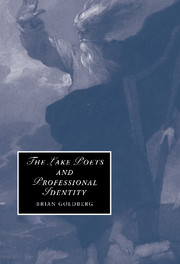Book contents
Introduction: Professionalism and the Lake School of Poetry
Published online by Cambridge University Press: 14 January 2010
Summary
When William Wordsworth, Robert Southey, and Samuel Taylor Coleridge – the Lake school – formulated their earliest descriptions of the role of the poet, two models of vocational identity exerted special pressure on their thinking. One was the idea of the professional gentleman. In their association of literary composition with socially useful action, their conviction that the judgment of the poet should control the literary marketplace, and their efforts to correlate personal status with the poet's special training, the Lake writers modified a progressive version of intellectual labor that was linked, if sometimes problematically, to developments in the established professions of medicine, church, and law. In short, they attempted to write poetry as though writing poetry could duplicate the functions of the professions. The other model, and it is related to the first, is literary. Like the Lake poets, earlier eighteenth-century authors had been stimulated, if occasionally frustrated, by the puzzle of how to write poetry in the face of changing conceptions of intellectual work. While ideals of medical, legal, and theological effectiveness that measured “technique” were competing with those that emphasized “character,” literary production was moving (more slowly and less completely than is sometimes thought) from a patronage- to a market-based model. Eighteenth-century writers developed a body of figural resources such as the poetic wanderer that responded to new constructions of experience, merit, and evaluation, and the Lake writers seized on these resources in order to describe their own professional situation.
- Type
- Chapter
- Information
- The Lake Poets and Professional Identity , pp. 1 - 24Publisher: Cambridge University PressPrint publication year: 2007



